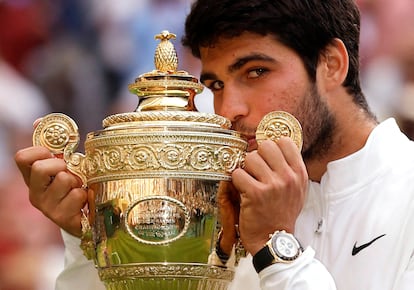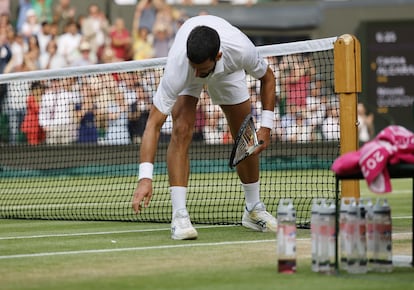Alcaraz defeats Djokovic, takes Wimbledon and installs a new regime
The 20-year-old Spaniard defeated the reigning champion in five sets. The Serb breezed through the first set but the young challenger made a comeback, winning his first-ever Wimbledon title


Quite at ease, Carlos Alcaraz demolished a castle and embraced the golden trophy he always dreamed of. “You’re mine now,” he said with his eyes.
Novak Djokovic hadn’t been beaten at Wimbledon since 2013. He’s won seven titles at the All England Club in total; he hadn’t lost any of his previous 45 matches played on Center Court. Since July 13, 2017, nobody has been able to stop his inexorable march to the title. But clearly, Alcaraz, only 20 and from a small village in southeastern Spain, doesn’t understand that there are limits in tennis. In addition to the U.S. Open he won last year, Alcaraz is now a Wimbledon champion.
The final score was 1-6, 7-6, 6-1, 3-6, 6-4. The five-set exhibition was memorable and loaded with symbolism, given the two generations doing battle. Since he was a small boy, Alcaraz has considered Djokovic to be one of his heroes. At four hours and 42 minutes, the clock stopped and the world of tennis witnessed the definitive birth of a new era.
Alcaraz is the fifth Spaniard to be crowned the king of the tournament that stands out among all tennis tournaments. He joins Manolo Santana (1966), Conchita Martínez (1994), Rafael Nadal (2008 and 2010) and Garbiñe Muguruza (2017). Only Boris Becker, who was 17 when he won Wimbledon in 1985 and 18 when he won in 1986, and Björn Borg, who was 20 when he took his first Wimbledon title, received their tennis doctorate at an earlier age than Alcaraz. But after a windy, chaotic match, he’s certainly a worthy successor.
Djokovic doesn’t have a brain inside his skull: instead, the Serbian champion has a tennis court. There isn’t a millimeter of the court that he doesn’t control, nor a shot that he doesn’t execute with maximum precision. He’s a Cartesian in the cathedral; he eats tennis for breakfast, lunch and dinner. This is why the victory of a 20-year-old boy over him has been such a miraculous transcendence.
In the lead-up to the match, more had been said and written about the minds and motives than about the sport itself. And then, Djokovic quickly won the first point. He showed up with his chin held high and shoulders well-squared, with a strong step and a haughty gait. Meanwhile, Alcaraz looked nervous. His shoulder kept seizing and his right hand shook as he looked up at the craftsmanlike shots delivered by Djokovic.
Andy Murray — the last man to beat Djokovic at Wimbledon — watched the game play out from the stands. He was impressed: in just a decade, Djokovic had reached the level of Federer. But the crowd openly celebrated each point won by the Spaniard, emitting a murmur each time he went for a second serve or suffered a slip. For the entire first set, Djokovic toyed with his prey, delivering a masterclass of tennis: this is how you play on the green stuff. Alcaraz only began to loosen up as the first set was all but lost.
Starting afresh in the second set, the Spaniard hit a shot to the far-right, finally gaining a foothold in the game. The monologue suddenly turned into a dialogue, although the superstar from Belgrade kept his rival under permanent stress. Playing against Djokovic on the London grass is, simply, torture.

Even so, Alcaraz regained his nerve. His parents and his three brothers — Álvaro, Sergio and Jaime — cheered him on from the box, as he took a 2-0 lead. But then, Djokovic brought him back down to earth, basically telling him, “this is how it goes, kiddo,” as he rallied back into contention. No matter. The Spaniard savors adrenaline and challenges. “Here I am,” Carlos seemed to respond. And for all those watching, they saw a new regime being born.
So, indeed, there is an end. As the Spaniard tempered himself, accelerated the play, took deep breaths, he began breaking out into smiles — an unbeatable sign. He smashed Djokovic’s impressive record when it comes to tiebreakers (15 successive wins in Slams this year). While his backhands kept failing, he managed to stop the bleeding.
Brad Pitt applauded, stylishly munching his fries in the stands while Hugh Jackman and Rachel Weisz commented on the points in fascination. This was like watching two sci-fi athletes. Eventually, Djokovic hit the wall. Alcaraz improved his percentages, overturning his shaky start. New talents don’t ask: they take. Endless volleys, hits and hits, returns and returns. In the fifth game of the seond set, a marathon 26-minute match within a match, the Spaniard sent the Serb to the thinking corner.
Djokovic wasn’t used to trailing in his own territory, although after emerging from the locker room, neat and combed, he appeared refreshed, ready to start a new day. You could forget that he left his racket in shreds.
Alcaraz didn’t shrink from a show of strength; he combined his muscle with the most delicate moments of skill. While his arm was inflamed, he managed to resolve everything with grace, marking a historic turning point in tennis. He was born for this. Carlos Alcaraz Garfia is his full name. From the little town of El Palmar, he’s the next great phenomenon.
Sign up for our weekly newsletter to get more English-language news coverage from EL PAÍS USA Edition
Tu suscripción se está usando en otro dispositivo
¿Quieres añadir otro usuario a tu suscripción?
Si continúas leyendo en este dispositivo, no se podrá leer en el otro.
FlechaTu suscripción se está usando en otro dispositivo y solo puedes acceder a EL PAÍS desde un dispositivo a la vez.
Si quieres compartir tu cuenta, cambia tu suscripción a la modalidad Premium, así podrás añadir otro usuario. Cada uno accederá con su propia cuenta de email, lo que os permitirá personalizar vuestra experiencia en EL PAÍS.
¿Tienes una suscripción de empresa? Accede aquí para contratar más cuentas.
En el caso de no saber quién está usando tu cuenta, te recomendamos cambiar tu contraseña aquí.
Si decides continuar compartiendo tu cuenta, este mensaje se mostrará en tu dispositivo y en el de la otra persona que está usando tu cuenta de forma indefinida, afectando a tu experiencia de lectura. Puedes consultar aquí los términos y condiciones de la suscripción digital.








































